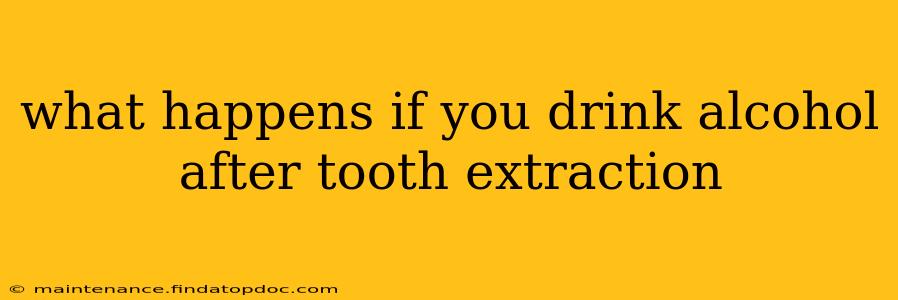Having a tooth pulled can be a bit of a rough experience. Between the discomfort and the need for proper healing, it's crucial to follow your dentist's post-operative instructions carefully. One frequently asked question revolves around alcohol consumption: what happens if you drink alcohol after tooth extraction? The short answer is: it's generally best to avoid it, and here's why.
Why You Should Avoid Alcohol After Tooth Extraction
Alcohol can significantly interfere with the healing process after a tooth extraction. Here's a breakdown of the potential negative consequences:
-
Increased Bleeding: Alcohol acts as a blood thinner. This means that consuming alcohol after a tooth extraction can increase the risk of bleeding, both immediately and in the days following the procedure. Prolonged or excessive bleeding can delay healing and potentially lead to complications.
-
Impaired Blood Clot Formation: A crucial part of the healing process is the formation of a blood clot in the extraction socket. This clot protects the underlying bone and nerves and acts as a foundation for new tissue growth. Alcohol can interfere with this process, making it more difficult for the clot to form and increasing the risk of a “dry socket.”
-
Dry Socket (Alveolar Osteitis): This painful complication occurs when the blood clot is dislodged or fails to form properly. It exposes the underlying bone and nerve endings, leading to severe pain, bad breath, and a foul taste in the mouth. Alcohol significantly increases the risk of developing a dry socket.
-
Increased Risk of Infection: Alcohol can weaken your immune system, making you more susceptible to infection. After a tooth extraction, the extraction site is vulnerable to bacteria, and an impaired immune system can hinder the body's ability to fight off infection.
-
Increased Pain and Swelling: Alcohol can exacerbate pain and swelling associated with the extraction. This can make the recovery process more uncomfortable and prolonged.
-
Interaction with Medications: Many post-extraction medications, such as pain relievers, can interact negatively with alcohol. This interaction can lead to unexpected side effects, increased drowsiness, or even liver damage. Always check with your dentist or pharmacist about potential interactions.
How Long Should You Avoid Alcohol After Tooth Extraction?
The recommended timeframe for abstaining from alcohol after a tooth extraction varies, but generally, it's best to avoid it for at least 24-48 hours, and possibly longer depending on the complexity of the procedure and your individual healing process. Your dentist will provide specific guidance based on your situation.
What About a Small Amount of Alcohol?
Even a small amount of alcohol can still pose risks. It’s best to err on the side of caution and completely avoid alcohol until your dentist gives you the all-clear. Your health and proper healing should be prioritized.
What if I Accidentally Drank Alcohol After Tooth Extraction?
If you accidentally consumed alcohol after your tooth extraction, monitor yourself closely for any signs of increased bleeding, pain, swelling, or infection. Contact your dentist immediately if you experience any of these symptoms.
Other Important Post-Extraction Care Tips
Beyond avoiding alcohol, remember these important post-extraction care tips:
- Follow your dentist's instructions carefully.
- Gently rinse your mouth with saltwater.
- Apply ice packs to reduce swelling.
- Take prescribed pain medication as directed.
- Eat soft foods.
- Avoid strenuous activity.
By following your dentist's advice and taking care of your extraction site properly, you can significantly improve your chances of a smooth and comfortable recovery. Remember, your health is paramount!
